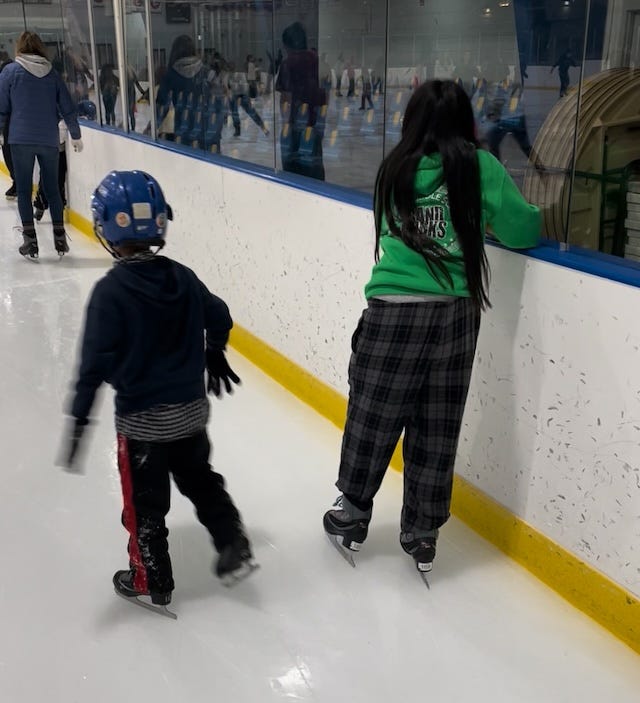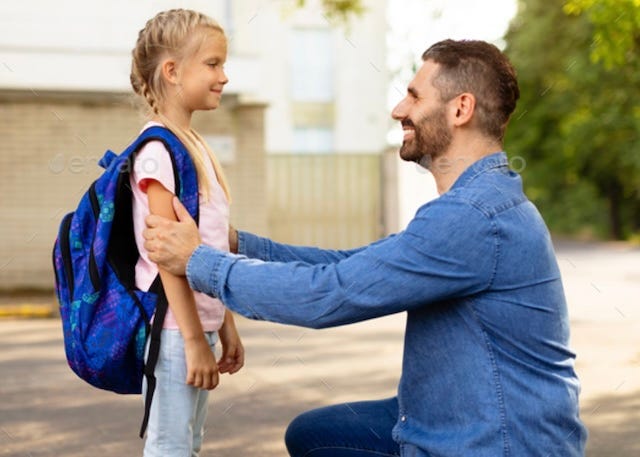Fear is a catalyst for growth
Create confident kids by helping them overcome their fears
Parenting Matters #98
By: Catherine Lynch and Glenn Collins
Dear awesome Parent,
If you’re anything like us, you spend a lot of time talking your kids into doing things they’re afraid of. Like sleeping in their own room, swimming, talking to authority figures, or driving.
We all have fears. It’s a survival mechanism wired into our brains at the most primitive level. Being afraid a sabertooth tiger might jump out from behind every tree or rock kept our ancestors cautious and alive.
And today a healthy amount of fear helps keep us - and our kids - alive.
But allowing our kids’ fears to dictate their choices and control their actions can be a real limitation in their lives. It makes their lives smaller. They get used to taking the safe path and staying in their comfort zone. It causes them to miss out on joy, experiences, and opportunities. Their adult lives will be harder too, because no matter where they go or what they do, there’ll always be situations where fear arises. How they deal with it - or not - will greatly affect the quality of their life.
Over the holiday break we saw first hand how fear can impact kids’ ability to learn a new skill. We took our two 11 year old granddaughters and their younger brothers (ages 7 and 8) ice skating. None of them had skated before, but there was a huge difference in the amount of progress they made. By the end of the 2 hour session the boys were actually skating. They couldn’t make it around the rink without falling, but they were skating. The girls held onto the wall the whole time and made very little progress.
The main difference?
The girls were afraid of falling, and the boys weren’t.
We’d tried to inoculate them against the fear of falling by telling them ahead of time that they were going to fall and that it was ok. It was just part of learning to ice skate. That falling was even fun! It was like sliding on the snow - which they’d all done and had fun with. The boys took it to heart and gleefully threw themselves down on the ice and had a blast. The girls, not so much. In fact, they weren’t having any of it.
Of course we couldn’t leave it like that. We really wanted the girls to learn to skate. So we took them all again and doubled down on helping them with their fear of falling. We held their hands. We showed them how to push off their edges. We encouraged them. We talked about falling when we had learned. We had them use the walkers the rink has to help new skaters. The result? About the same as before. The boys got better, and the girls were still afraid to let go of the wall.
Frustrating!
If they would just listen to us and stop being afraid!
As if it were that easy.
Fear comes from a primitive part of our brain and it’s hard to logic your way out of it.
But we weren’t going to give up on the girls, so we took them again. And this time things were different. But not because of anything we did. It just so happened that there were friends of theirs there.
Friends who could ice skate.
In no time at all they were out in the middle of the rink trying to skate. And falling. But getting back up and trying again! By the end of the session they’d made huge progress. They were actually skating! As we were leaving they wanted to know when we could go again. 😃
———————————————————
Helping our kids get past their fears is often a matter of patience and finding the right approach. In this case, it was having friends present who were better than they were. Friends they wanted to keep up with. Friends they didn’t want seem afraid in front of.
We all know that conquering a fear of falling on the ice won’t be a make or break life event for our granddaughters. Fear of falling, or deep water, or heights are all physical fears. They’re natural and pretty straightforward.
But physical fears aren’t the only kinds of fear our kids face. More insidious are the social or interpersonal fears that can truly hinder their happiness and success in life. Fear of failure. Fear of rejection. Fear of embarrassment. Fear of conflict. These, and similar fears, can truly stifle their progress and development.
As much as we’d all like to, we can’t magically take our kids fears away. We can’t protect them from all the things they might be afraid of. Truthfully, we shouldn’t even try. It’s part and parcel of living. The best armor we can give them is confidence in themselves and their ability to overcome their fears. But helping them form this self-confident identity isn’t a quick process. It’s build bit by bit with every fear they successfully face down.
Does this mean we should make them go out and face all the fears they have? In their most extreme form?
Fear of heights - take them sky diving.
Fear of water - make them do open ocean swimming.
Fear of public speaking - put them on stage for open mic night at the comedy club.
LOL - Of course not!
But the fears that come up in the course of their lives?
Absolutely!
And should we find challenging activities that push them out of their comfort zones?
Again, absolutely!
How your kids respond to the things that frighten them shapes their self-image with regards to fear and risk. Their experiences can either strengthen their identity of “I give in to my fears”, or those experiences can help them create an “I face my fears” identity.
As a parent, you have a tremendous amount of influence with your kids. How you help them cope with their fears has a big impact on whether or not they can overcome them. Luckily, there’s lots of things you can do to make it more likely they’ll be able to move past their fears. You can set them up for success by incorporating some of these approaches the next time your kid comes up against something they’re afraid of.
Gradual exposure. They don’t need to face down their fears the first time they encounter a new experience. Fears are generally easier to overcome as they become more familiar. We see this all the time in teaching our kids and grandkids to swim.
Go at their pace. Let them set the pace as they take on fearful activities. Beyond not causing them to dig in their heels, this practice means they’re learning how to cope with their fears within themselves. When our grandkids finally venture into water over their heads it’s because they’ve decided to do it - despite their fears. This is when real growth occurs.
Role modeling. Be open about your own fears and how you overcome them.
Validate their feelings. Acknowledge their fear and let them know it’s ok to be afraid. Courage isn’t lack of fear, it’s going forward despite the fear.
Have confidence in them. it’s much easier for them to believe in themselves if they know you do. Let them know.
Get their input. Your kid knows they’re afraid and probably wants to get past it. Encourage them to brainstorm ways to make progress. They’re more likely to try something they came up with on their own.
Friends. Involve their friends in the activity. Kids, particularly teens, are incredibly concerned with fitting in with their peer group. Fear of missing out and not wanting to be seen as afraid to do something their friends are doing is a great way to get them to push past their fears. This is what pushed our granddaughters past their fear of falling.
Talk about their successes. When you see them make progress with their fears, tell them about it! Praise their effort and grit. Let them know you’re proud of them.
And here’s a short list of some of our least favorite ways parents use to get their kids to do things they’re afraid of:
Forcing. Using physical force or intimidation to force them to do something they’re afraid of.
Belittling. Mocking, shaming, or ridiculing them into doing something they’re afraid to do.
Punishments. Using threats of punishment to get the behavior they want.
Comparison. Negatively comparing their child to other kids to get them to do something.
Dismissing. Being dismissive of their fears or telling them that their fears are baseless.
And now a little foray into fear in literature and pop culture
Later this year part 2 of Denis Villeneuve’s adaptation of Frank Herbert’s science fiction masterpiece Dune will be coming to a theater near you. In the movie, as in the book, facing and overcoming one’s fears is a central theme. Facing one’s fears is viewed as a catalyst for change and growth. Failing to overcome one’s fear results in stagnation and death. Hiebert’s views on fear are encapsulated in the Litany Against Fear that the main character Paul Atreides uses to help him face his fears.
I must not fear.
Fear is the mind-killer.
Fear is the little-death that brings total obliteration.
I will face my fear.
I will permit it to pass over me and through me.
And when it has gone past, I will turn the inner eye to see its path.
Where the fear has gone there will be nothing. Only I will remain.
While the fate of an interstellar empire might not rest on your kids’ response to their fears, how they learn to cope with them - or not - will have a profound impact on the lived quality their lives. If we don’t help them learn to come to terms with their fears, those fears will circumscribe their lives, limit their opportunities, and curtail their joy.
Have a story about how you helped your kid overcome something they were afraid of? We’d love to hear about it!
Home Practice:
Identify a few of your own fears and choose one to work on. That doesn’t mean you have to eliminate it entirely, but commit to making it smaller and weaker. Tell your family what you’re doing so they can hold you accountable, cheer you on, and watch you role modeling consciously minimizing one of your fears.
Talk to your spouse/parenting partner about your kid’s fears. Identify one that you’d like to minimize and brainstorm the first few steps you’ll take to help make that happen. Better yet, let your kid choose which one of their fears to work on!
A walk in the snow
We love taking walks during a snowstorm. The crisp cold air. The sound of falling snow. The absence of manmade sounds. That indefinable smell of falling snow. And the tree limbs limned in white.







